(科普版)六年级英语下册课件lesson1
- 格式:ppt
- 大小:895.00 KB
- 文档页数:25
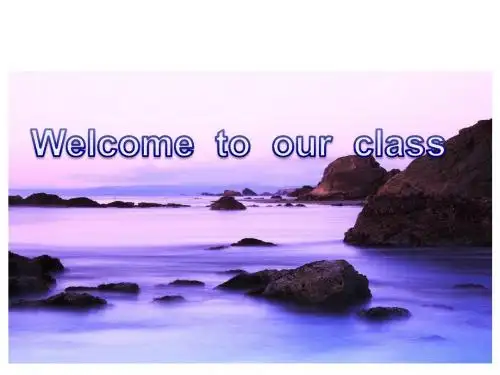
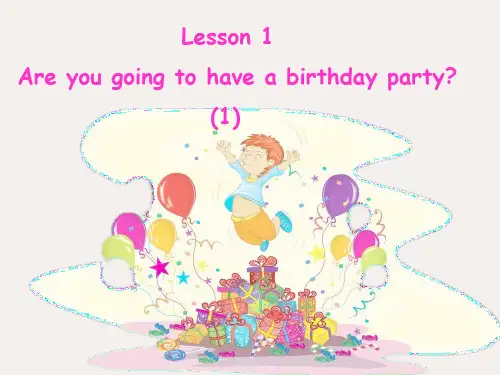
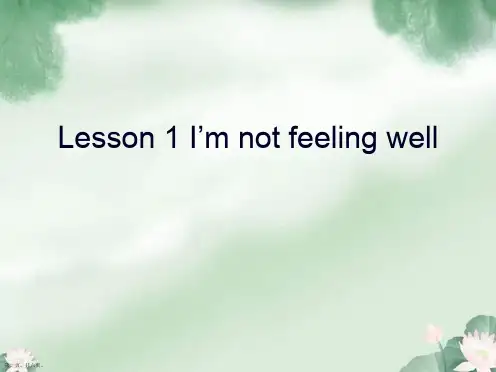

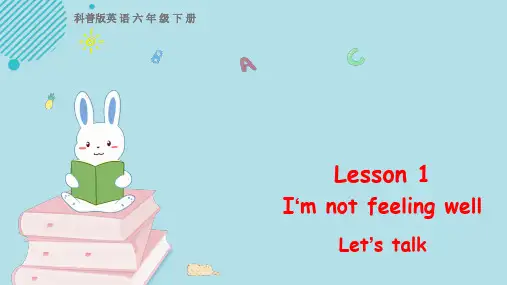
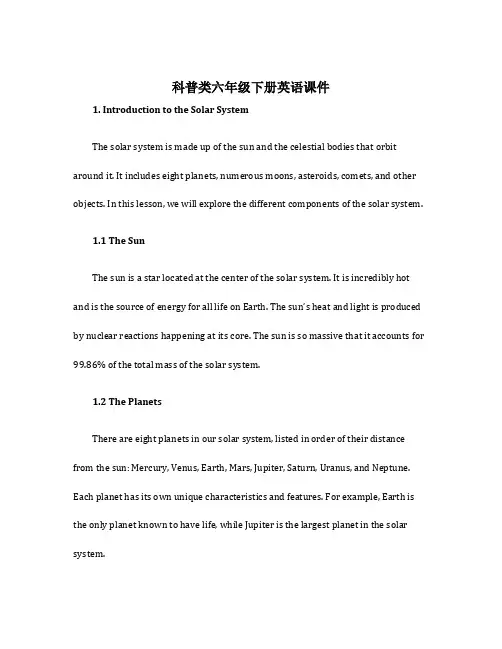
科普类六年级下册英语课件1. Introduction to the Solar SystemThe solar system is made up of the sun and the celestial bodies that orbit around it. It includes eight planets, numerous moons, asteroids, comets, and other objects. In this lesson, we will explore the different components of the solar system.1.1 The SunThe sun is a star located at the center of the solar system. It is incredibly hot and is the source of energy for all life on Earth. The sun’s heat and light is produced by nuclear reactions happening at its core. The sun is so massive that it accounts for 99.86% of the total mass of the solar system.1.2 The PlanetsThere are eight planets in our solar system, listed in order of their distance from the sun: Mercury, Venus, Earth, Mars, Jupiter, Saturn, Uranus, and Neptune. Each planet has its own unique characteristics and features. For example, Earth is the only planet known to have life, while Jupiter is the largest planet in the solar system.1.3 MoonsMoons are natural satellites that orbit around planets. They come in various sizes and shapes. For example, Earth has one moon, while Jupiter has over 70 moons. Moons are fascinating because they can have their own atmosphere and even support liquid water, like Jupiter’s moon Europa.1.4 Asteroids and CometsAsteroids are rocky objects that orbit around the sun. They are smaller than planets but larger than meteoroids. They are often found in the asteroid belt, a region located between the orbits of Mars and Jupiter. Comets, on the other hand, are made up of ice, dust, and rock. They have a tl that forms when they approach the sun and the heat causes the ice to vaporize.2. Exploring Outer SpaceIn this lesson, we will learn about the different ways humans have explored outer space. From the first satellite to manned missions to other planets, we have come a long way in our understanding of the universe.2.1 Early Space ExplorationThe space age began with the launch of the first artificial satellite, Sputnik 1, by the Soviet Union in 1957. This event marked the beginning of the space race between the United States and the Soviet Union. In the following years, both countries sent several manned missions to space, including the famous Apollo Moon landing by the United States in 1969.2.2 Space TelescopesSpace telescopes are telescopes placed in outer space to observe distant celestial objects without the interference of Earth’s atmosphere. They have provided us with breathtaking images and valuable data about the universe. Examples include the Hubble Space Telescope and the Kepler Space Telescope.2.3 Robotic MissionsRobotic missions are unmanned spacecraft sent to explore outer space. They are equipped with instruments and cameras to collect data and transmit it back to Earth. Some famous robotic missions include the Voyager program, which sent spacecraft to explore the outer planets, and the Mars rovers, such as Curiosity and Perseverance.2.4 Future of Space ExplorationThe future of space exploration looks promising. Scientists and engineers are working on new technologies and missions to further our understanding of the universe. For example, there are plans to send humans to Mars, establish a lunar outpost, and search for signs of life on other planets.ConclusionThe solar system is a fascinating subject to explore. From the sun to the planets, moons, asteroids, and comets, there is so much to learn about our cosmic neighborhood. Outer space exploration has also shown us the vastness and beauty of the universe. As we continue to push the boundaries of space exploration, we will undoubtedly uncover more mysteries and make amazing discoveries.Note: Markdown文本格式适用于编写文档,但在展示时需要使用Markdown 渲染工具或将其转换为其他格式。
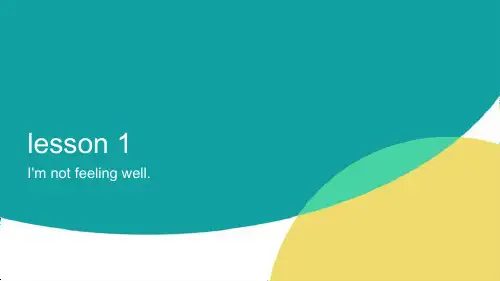
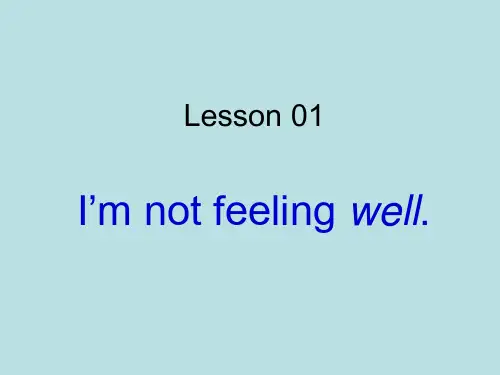
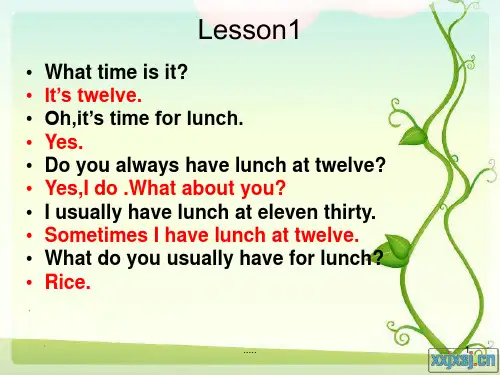
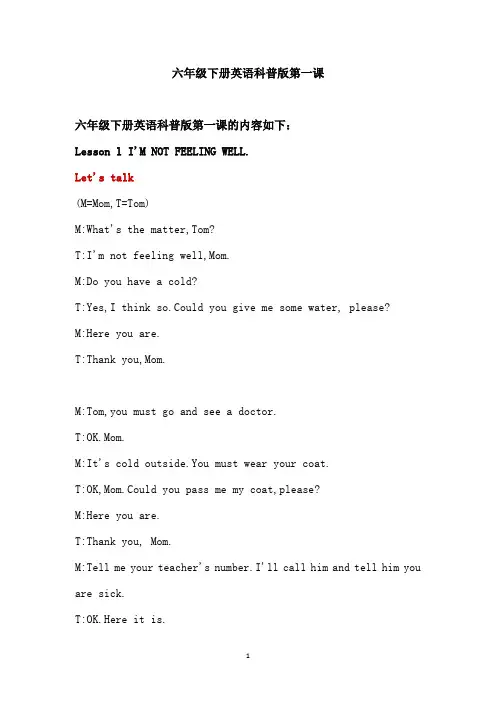
六年级下册英语科普版第一课六年级下册英语科普版第一课的内容如下:Lesson l I'M NOT FEELING WELL.Let's talk(M=Mom,T=Tom)M:What's the matter,Tom?T:I'm not feeling well,Mom.M:Do you have a cold?T:Yes,I think so.Could you give me some water, please?M:Here you are.T:Thank you,Mom.M:Tom,you must go and see a doctor.T:OK.Mom.M:It's cold outside.You must wear your coat.T:OK,Mom.Could you pass me my coat,please?M:Here you are.T:Thank you, Mom.M:Tell me your teacher's number.I'll call him and tell him you are sick.T:OK.Here it is.Let's learn—I'm not feeling well.—What's the matter?—I have a cold.Could you give me some water,please? —OK.I have a cold,mewe have a cough,usthey have a fever,themhe has a headache,himshe has a toothache,herA gameI have a cold.Could you give me a coat?He has a cold.Give him a coat.I have a fever.Could you give me some water?She has a fever.Give her some water.I have...Ask and answerWhat's the matter?I have a fever.Could you give me some water?Here you are.Thank you.Listen and numberMarkslisten and say(S=Sam,T=Tom)S:Hi,Tom.It's Sam.There is a football game this afternoon.Do you want to watch it?T:No. thanks.I have a bad cold.S:Oh.You should drink plenty of water and stay in bed.T:Yes,I'm in bed now.S:You can watch the football game on TV.T:Yes,my father will be with me.S:That's good!ReadA good habitDan often stayed up late and got up late.At last he became ill.He had a bad headache, and couldn't get to sleep at night.So he went to see a doctor.“Oh,you look tired. What's the matter?”the doctor asked.“I have a bad headache and can't get to sleep at night,”Dan said.When do you usually go to bed?”“I usually go to bed after 12 o'clock.”You should go to bed before 10 o'clock.Drink some milk before you go to sleep.I'm sure you will sleep well and get better soon.”From then on, Dan went to bed early and soon he got better.It's a good habit to go to bed early and get up early.。
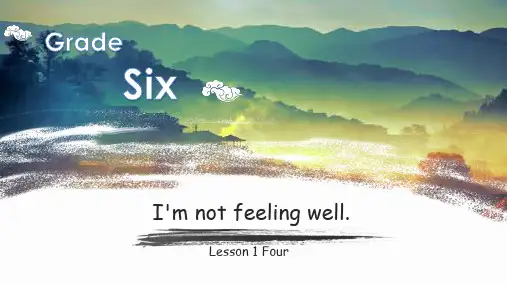
科普版英语课件六年级下册一、引言科普版英语课件六年级下册是适用于中国六年级学生的英语教材,旨在通过科普知识的介绍,提高学生的英语水平和科学素养。
本课件的内容丰富多样,采用交互式的学习方式,帮助学生更好地理解和记忆英语知识。
下面将详细介绍六年级下册的教材内容和学习方法。
二、教材内容下面是六年级下册的教材内容概览:1. Unit 1: Exploring Space本单元主要介绍太空探索相关的知识,包括宇航员、太空飞行器、卫星等。
学生将学会用英语描述太空探索的相关话题,了解太空探索的历史和意义。
2. Unit 2: Environmental Protection本单元着重介绍环境保护的重要性,学生将学到如何保护环境和资源的方法,以及环境污染对我们生活的影响。
通过学习本单元,学生将了解到环境保护是每个人的责任。
3. Unit 3: Weather and Climate本单元主要介绍天气和气候的相关知识,包括天气的表达、天气现象的解释以及气候变化的原因和影响。
学生将学会用英语谈论天气和气候,增加对自然环境的认识。
4. Unit 4: Animal World本单元主要介绍动物世界的知识,包括动物分类、动物的特征以及不同动物的习性和生活环境等。
学生将学习如何用英语描述动物,了解动物对我们生活的重要性。
5. Unit 5: Healthy Lifestyle本单元重点介绍健康的生活方式,包括饮食平衡、锻炼习惯、个人卫生等。
学生将学习如何用英语描述健康的生活习惯,增加对健康的重视。
6. Unit 6: Technology and Inventions本单元主要介绍科技和创造的相关知识,包括不同的科技产品和创造,以及它们对我们生活的影响。
学生将学会用英语描述科技和创造的话题,增加科技素养的同时提高英语水平。
三、学习方法下面是几种有效的学习方法,帮助学生更好地掌握英语知识:1. 多听多说多听英语材料,如英语歌曲、英语电影、英语播送等,培养学生的听力能力。